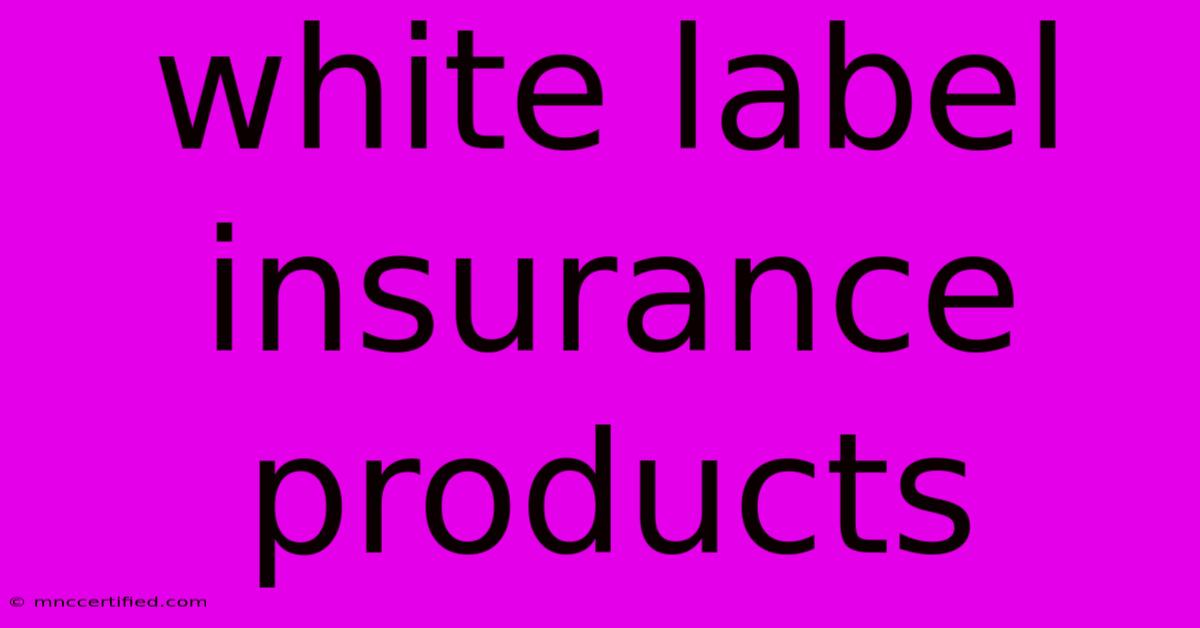White Label Insurance Products

Table of Contents
White Label Insurance Products: A Comprehensive Guide for Businesses
White label insurance products offer a powerful opportunity for businesses to expand their offerings and increase revenue streams. But what exactly are they, and how can they benefit your company? This comprehensive guide will explore the world of white label insurance, detailing its advantages, disadvantages, and how to choose the right partner.
What are White Label Insurance Products?
White label insurance products allow businesses to offer insurance policies to their customers under their own brand name, without needing to establish their own insurance company. Essentially, you're partnering with an established insurer who handles all the regulatory compliance, underwriting, claims processing, and other complex aspects of the insurance business. You, in turn, benefit from increased customer loyalty, expanded product offerings, and a new revenue source. Think of it as buying a product wholesale and reselling it under your brand.
Key Features of White Label Insurance:
- Branding: The insurance policies are branded with your company's logo and messaging.
- Customization: You often have some level of customization available, allowing you to tailor the policies to your target audience.
- Simplified Operations: You don't need to deal with the complexities of insurance regulations and operations.
- Revenue Generation: Earn commission or fees on each policy sold.
Benefits of Offering White Label Insurance
The advantages of incorporating white label insurance into your business model are significant:
- Increased Customer Value: Offer a valuable, complementary product that enhances customer loyalty and retention. Customers appreciate the convenience of one-stop shopping.
- New Revenue Streams: Generate additional income without needing significant capital investment or a large workforce.
- Enhanced Brand Reputation: Offering insurance demonstrates a commitment to customer care and builds trust.
- Competitive Advantage: Differentiate your business from competitors by providing a unique and valuable service.
- Reduced Operational Overhead: Eliminate the need to build and maintain an in-house insurance operation, saving time and resources.
Disadvantages of White Label Insurance
While the benefits are compelling, it’s crucial to acknowledge potential drawbacks:
- Limited Customization: While some customization is typically offered, you might not have complete control over policy details.
- Dependence on a Third-Party: Your success relies on the performance and reliability of your white label insurance provider. Thorough due diligence is essential.
- Commission Structures: Commission rates and payout structures can vary significantly between providers. Negotiate favorable terms.
- Potential Reputational Risk: If your partner experiences issues, it could negatively impact your brand's reputation. Choose a reputable and financially stable provider.
Choosing the Right White Label Insurance Provider
Selecting the right partner is crucial for the success of your white label insurance program. Consider these factors:
- Financial Stability: Verify the provider's financial health and longevity.
- Regulatory Compliance: Ensure they adhere to all relevant insurance regulations.
- Product Range: Choose a provider offering a range of products suitable for your target market.
- Technology and Support: Assess their technology infrastructure and customer support capabilities.
- Commission Structure: Negotiate a commission structure that aligns with your business goals.
- Contract Terms: Carefully review the contract terms and conditions before signing.
Types of White Label Insurance Products
The range of available white label insurance products is diverse and continues to expand. Some popular options include:
- Pet Insurance: A growing market with high customer demand.
- Travel Insurance: Appeals to a broad customer base, especially those planning international trips.
- Health Insurance: A complex area requiring careful consideration of provider capabilities and regulatory compliance.
- Life Insurance: A significant financial product requiring careful selection of a reputable provider.
- Home & Auto Insurance: Common products, but often require a more established business relationship with the provider.
Conclusion: Unlocking Growth with White Label Insurance
White label insurance products present a compelling opportunity for businesses seeking to expand their offerings and enhance customer value. By carefully selecting a reliable partner and understanding the associated benefits and drawbacks, you can leverage this strategy to unlock significant growth and increase your profitability. Remember thorough due diligence and a strong emphasis on customer satisfaction are vital for long-term success.

Thank you for visiting our website wich cover about White Label Insurance Products. We hope the information provided has been useful to you. Feel free to contact us if you have any questions or need further assistance. See you next time and dont miss to bookmark.
Featured Posts
-
Trump Names Bhattacharya Nih Head
Nov 27, 2024
-
Vault Investment Bank Rankings
Nov 27, 2024
-
2025 26 Council Budget Savings Consultation
Nov 27, 2024
-
Attack On Former Coyotes Paul Bissonnette
Nov 27, 2024
-
Havant Mp At Ucl
Nov 27, 2024